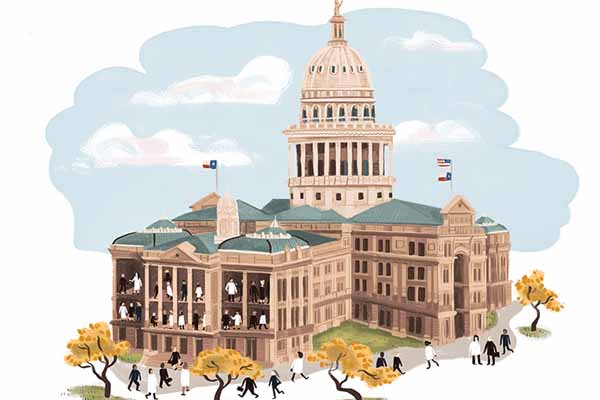
Charting Medicine's Statehouse Progress
When it comes to shooting down dangerous attempts to expand non-medical practitioners’ scope of practice, TMA’s advocacy army once again proved to be expert marksmen in 2019.
Medicine trained its scope on bills that would have allowed nurse practitioners, chiropractors, and optometrists, among others, to wade into the practice of medicine. Those and other bad bills fluttered to the ground in heaps of feathers, thanks to the house of medicine reminding lawmakers there are certain practices only a physician is trained to do.
Take House Bill 2733 by Rep. Phil Stephenson (R-Wharton). That measure would have expanded the practice of chiropractic beyond its current scope – defined in the law as the musculoskeletal system – and introduced the possibility of chiropractors treating the “neuromusculoskeletal” system; in other words, giving chiropractors the authority to treat the nervous system as well.
The bill was a direct byproduct of a long-running disagreement between medicine and the state’s chiropractic board over chiropractors’ authority to perform vestibular-ocular-nystagmus testing. That court battle includes a dispute over whether nerves are part of a chiropractor’s scope of practice. (See “The Eight Years’ War,” February 2019 Texas Medicine, pages 32-33, www.texmed.org/eightyearswar.)
Austin neurologist Sara Austin, MD, says keeping nervous system treatment as the practice of medicine is a matter of patient safety.
Adding the nervous system to the scope of chiropractic “has the effect of being really confusing to patients,” Dr. Austin said. “There’s chiropractors now who like to call themselves ‘neurochiropractors.’ No one knows what that means, what their training is or anything, and they’re actually not supposed to be practicing neurology. But they do it anyway. … The public just assumes that means they can take care of the nervous system, which is not true.”
Other troublesome scope-of-practice bills TMA helped bring down include:
• House Bill 1792 by Rep. Stephanie Klick (R-Fort Worth) sought full independent practice and prescribing authority for advanced practice registered nurses (APRNs) without physician delegation and supervision.
• House Bill 1798 by Rep. Craig Goldman (R-Fort Worth) would have allowed therapeutic optometrists to perform a number of eye surgeries, including LASIK, and independently manage glaucoma.
• House Bill 1092 by Rep. Bill Zedler (R-Arlington) would have granted independent prescribing authority to psychologists.
• House Bill 927 by Rep. James White (R-Hillister) would have granted independent practice and prescribing authority to APRNs in health professional shortage areas.
Medicine did agree with other professions on several scope-of-practice bills that passed, including ones that promote team-based care. Among them: Senate Bill 1056 by Sen. Judith Zaffirini (D-Laredo) allows a physician to enter into a collaboration agreement with a community pharmacist to perform drug therapy management for a specific patient; House Bill 2425 by Rep. Kyle Kacal (R-College Station) allows the same arrangement between physicians and pharmacists practicing in federally qualified health centers; and Senate Bill 2011 by Sen. Dawn Buckingham, MD (R-Lakeway), mandates a study on the feasibility of giving APRNs a streamlined path to completing medical school.
Tex Med. 2019;115(8):24
August 2019 Texas Medicine Contents
Texas Medicine Main Page